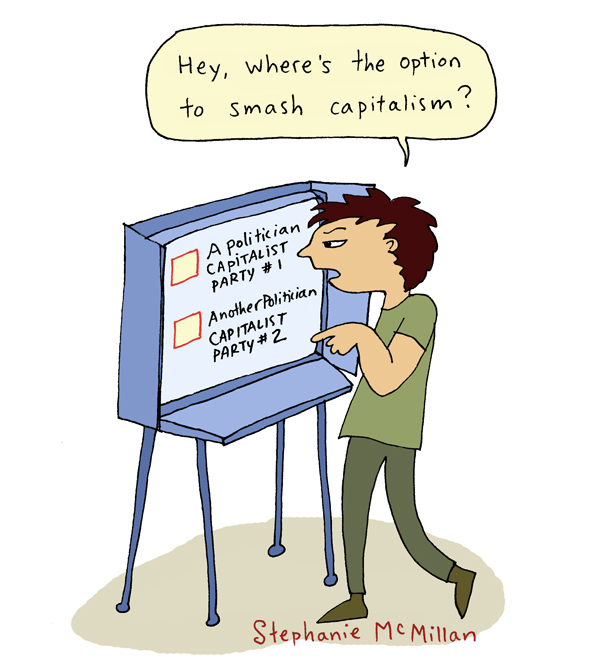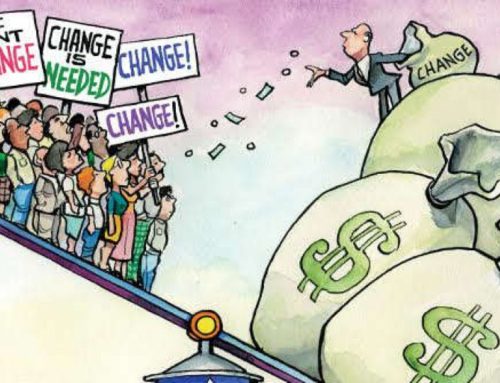 The following article is written by One Struggle in Iowa. Although they share the same name as us, as well as a strong level of unity on anti-capitalism and anti-imperialism, they are a completely autonomous organization. Their points of unity and perspectives may be different than ours. Nevertheless, the following article by Thomas Estabrook is worth sharing, as it makes great points about Bernie Sanders’ campaign and electoral politics in general.
The following article is written by One Struggle in Iowa. Although they share the same name as us, as well as a strong level of unity on anti-capitalism and anti-imperialism, they are a completely autonomous organization. Their points of unity and perspectives may be different than ours. Nevertheless, the following article by Thomas Estabrook is worth sharing, as it makes great points about Bernie Sanders’ campaign and electoral politics in general.
Thomas makes a great point in explaining that radical change cannot be advanced within the capitalist framework. Bernie Sanders’ campaign aspires to create change and bring about a ‘political revolution’ through state sponsored elections. At the same time, Thomas refrains from being ultra-leftist by adding that it’s fine to vote for some short-term, more immediate gain that can possibly bring some alleviation. As the authors describes, sure go ahead and vote for Bernie, but don’t lose sight. We’ll have to continue the struggle, through the elections hysteria and after.
By Thomas Estabrook
In deliberating on what to write about for this latest edition of the Hair of Samson, it was suggested that I write about Bernie Sanders. I was initially somewhat skeptical of this endeavor. After all, it is quite obvious that Sanders is not a socialist but a social democrat, and that his stances on drone strikes and Palestine are troubling at the very least. To criticize these aspects of his platform from a left-wing perspective would be incredibly naïve at best – it’s not as if such criticism will change his campaign in any meaningful way. Moreover, the American elections, like some jealous demiurge, demand such rapt attention that even talking about a presidential candidate seems like a capitulation.
However, being a bit of a contrarian, and continually seeing knee-jerk reactions by supposed “leftists” against any criticism of Sanders, I feel compelled to offer a measured criticism against the tendency to allow far-reaching and radical aspirations be eroded by supposedly “pragmatic” bourgeois political lines. As comrade Lenin wrote in The State and Revolution, “Today, the bourgeoisie and the opportunists within the labor movement concur in this doctoring of Marxism. They omit, obscure, or distort the revolutionary side of this theory, its revolutionary soul. They push to the foreground and extol what is or seems acceptable to the bourgeoisie.” He was writing about turn-of-the-century Russia, but the tendency he described is no less present today. Accordingly, I intend to criticize a couple aspects of Sanders’ campaign that seem least objectionable and most progressive, in an effort to elucidate the limitations of attempts at reform that fall within the horizons of liberal-democratic capitalism. I do not wish to argue against voting for Sanders, nor do I intend to posit some sort of “all-or-nothing” approach to socialism that allows tenuous strategic considerations to justify a failure to alleviate present suffering. Instead, I hope only to illuminate some theoretical considerations that are relevant to the struggle beyond the specific instance of the Sanders campaign.
To begin, then, the primary problem with supposing that Sanders is in some way radical hinges around the way his supposed “challenge” to capitalism comes entirely from within the bounds of what capitalism already considers acceptable. Consider, for example, his focus on the fact that some miniscule percentage of the richest Americans have more money than the bottom half. This is indeed a despicable state of affairs, but it serves to mystify the actual problems. After all, we would do well to ask ourselves what exactly would make for an actually fair income distribution. A fifteen dollar minimum wage? Taxing the highest earners at 90%? 95%? The ever-insightful Karl Marx responded to a similar question in his Critique of the Gotha Program: “Do not the bourgeois assert that the present-day distribution is “fair”? And is it not, in fact, the only “fair” distribution on the basis of the present-day mode of production? Are economic relations regulated by legal conceptions, or do not, on the contrary, legal relations arise out of economic ones?” When the left focuses its strategy on issues of income distribution, we risk ignoring the real problems leading to income inequality: the use of private property to exploit the working class. Using income redistribution to smooth over the theft inherent in the capitalist system is at best a temporary measure.
Alternatively, consider Sanders’ call for free college education. Again, this seems like an admirably progressive idea – challenging for-profit educational institutions, eliminating debt, and expanding the supposed “good” of education to a wider public all have an enticing rhetorical appeal. However, we should take the intent of this initiative into account: as Sanders’ website puts it, “In a highly competitive global economy, we need the best-educated workforce in the world.” Despite the “socialist” veneer, this ultimately amounts to an effort to render American capitalism more efficient, and little more. In all but the narrowest views, it is not liberatory, but merely a reformulation of exploitative class relations. And moreover, it is open to legitimate critique from opponents on the right – after all, it is possible that in some circumstances, having a larger portion of the population spend its productive youthful years in college might not make American capitalism more effective. A key limitation to welfare initiatives like universal education and healthcare is that they will always be at the mercy of the market unless action is taken to change the entire economic context in which they are situated.
Ultimately, I don’t think it matters much whether or not Sanders is actually elected. Even if he succeeds in attaining the oval office, there’s little reason to think that he will be able to handle congress even better than Obama has. And even if he does do that and manages to turn the USA into a Scandinavia-esque welfare state with universal healthcare, it’s not as if he will have disrupted the exploitation and capital accumulation relentlessly transpiring outside America’s borders (or within, for that matter). But, as mentioned previously, it isn’t as if one could reasonably expect an American presidential candidate to start talking about plans to impede capital accumulation and seize the means of production. The problem lies in the fact that there are those who think that income redistribution is a suitable substitute for the abolition of private property, that it is only consumption that must be made egalitarian, and not production, and that reforms brought about through bourgeois political institutions can replace revolutionary action by the proletariat.
Ultimately, the American left can do better. By all means, support Sanders – certainly, he’s preferable to any of the Republican candidates. But if the Sanders campaign causes those of us on the radical left to lose sight of our actual goals, then the elections have served their function as an instrument of bourgeois ideological domination. If we’re going to organize in support of Sanders, we need to have plans to continue the struggle after the election – even in the unlikely event that Sanders is elected, our work will not be over. As long as this strange and wonderful planet that we call home is dominated by the accumulation of capital, subjected to the inhuman bondage of the wage system, balkanized into an assortment of mutually opposed nation states, and slowly poisoned by the excesses of an economic system motivated by profit, our work will not be done.
Of course, this is not an easy path to pursue. It would be wonderfully convenient if we could peacefully overthrow capitalism by playing by the rules, thus not risking the retaliatory violence that inevitably strikes at every genuine revolution. But when the game itself is the problem, the only winning move is not to play. When the law is designed to reproduce capitalist property relations, we must become criminals. For those in the working class, this involves little more than the collective pursuit of class interests. For those of us in the petit bourgeoisie, this demands the unity of a rigorous theoretical understanding of capitalism with action in accordance with the interests of the proletariat.
Again, there are good reasons to support Sanders. It may be that in pushing for a welfare state, contradictions in capital will be exacerbated in ways that provoke the conditions necessary for actual change. And while slightly improving the standard of living in a single country is not radical goal, it is by no means a bad thing. It would be callous to ignore opportunities to alleviate suffering in the name of ideological purity. The key is not to mistake Sanders for an actual challenge to the capitalist order – that is something we have to provide ourselves.
So, feel the Bern all you want, but don’t let it be a substitute for the cleansing flames of revolution.






The point in the article is, on the whole, well-made – Sanders is not to be mistaken for a true left-wing candidate, and, indeed, his self-description makes it clear that he is not asserting that he is one. What I would take issue with in the writer’s argument, however, is the citation of Lenin; there are many different kinds of socialism that derive from Marx’s ideas, and I would have thought that Lenin’s version was less applicable to the contemporary situation, given the unfortunate course of the Soviet Union in the 20th century. If the writer is arguing for some form of socialism in today’s world, it seems a pity to use Lenin as an example of what one would like to accomplish in the development of world socialism. And I am not entirely sure that the writer is clear about whether violent revolution is a good idea or not. If Sanders is not left-wing enough, what is?
Very nice piece!